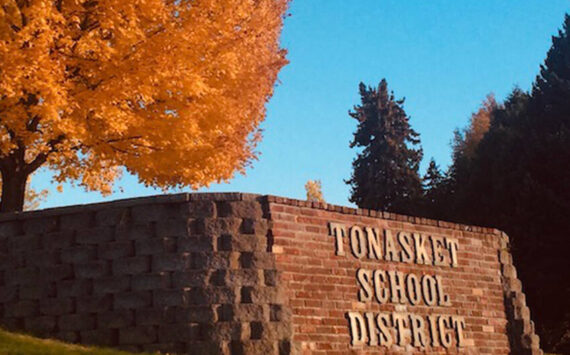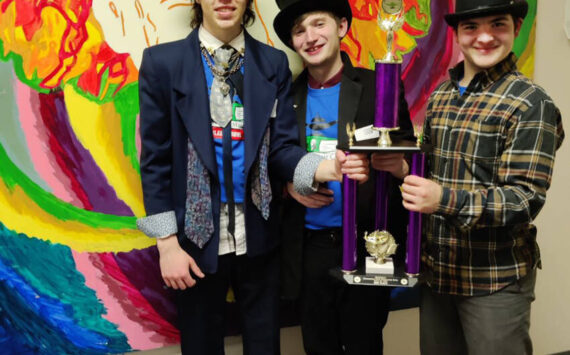TONASKET – Spray park or swimming pool?
According to city planner Kurt Danison, that shouldn’t even be the question. The answer, he said, is both, not either/or.
“There seems to be some confusion about that, and I’m not sure what that confusion is,” Danison said at the Tuesday, March 12, Tonasket City Council meeting.
“Linda Black has put together a great group that is working to get a splash park built this summer. .And regardless of that, we’re still pursuing a pool if that is what the community wants.”
Danison stressed that there is a big difference in both the scale and timetable of the two projects.
“One (the spray park) is a community effort to get something in ASAP,” he said, adding that the cost of maintenance of the spray park will be nearly zero. “The other (the pool) is much longer term. In some ways to me it is still amorphous as to who is actually pushing for the swimming pool. It would be lovely if a community organization stepped up that has the same kind of energy that Linda does to put something together like that. But a swimming pool is a whole lot more daunting and many, many times more expensive than a splash park. It’ll be a much longer-term effort.”
Both Danison (for the pool) and Black (for the spray park) have applied for grants from the Community Foundation of North Central Washington.
“The purpose of our grant is to get a small amount of money, potentially matching with some money from the Gordon Stangland bequeath to the city for the pool,” Danison said. “We’d use it to come up with a process that would identify and give us a picture of what we want to build. How much it’s going to cost, so we have a target for fundraising and (larger) grant applications.”
He said the next cycle of grant applications begins in 2014.
‘A year from now, we have to be in a position of knowing what we’re going to build, where we’re going to build it and what the estimated costs are going to be. Also, we’ll need to know by then where the remainder of the money is going to come from.”
Danison said that a typical grant would be a 50 percent matching grant.
“There could also be federal dollars we could get (for the pool), but some of that depends on their budget issues,” Danison said. “It seems unlikely, but the pool could qualify for both state and federal grants that could cover potentially 90 percent of it.
“A couple years ago I said that getting the pool declared obsolete hadn’t been done and was unlikely, but it did,” he said. “So I’m not going to say that there’s no way we can’t get that sort of grant.”
Of course, even once a proposed swimming pool is built, there is the cost of maintenance that will have to be accounted for. Such costs can vary widely depending on the type of pool, be it chlorinated or salt water, or indoor our outdoor. Indoor pools throughout the state have been shut down because of operating costs that often exceed $500,000 a year, primarily due to heating and ventilation.
Danison also reported that the comprehensive plan was in the process of being updated, as per instructions given by the council at a previous meeting. Some of that was to be discussed at a public workshop scheduled for March 19.
“We got a letter out to every property owner of record (in areas where property use designations were in question,” he said. “We’re trying to make sure we have an accurate map to work from. It’s important we review these critical areas regulations, so that when (city engineer) Varela and Associates prepares funding requests (for construction projects), they don’t lose points because we’re not in compliance.”
ATVs debated
The city council approved in principle the drafting of an ordinance to allow ATVs within the city limits.
What shape that ordinance will take, however, may take some time to agree on.
That much was clear after the first draft of the proposed ordinance was discussed at length.
Though cautioned by city clerk Alice Attwood that there were still revisions to be made, that didn’t prevent a lively debate from taking place over some of the particulars.
Most at issue: whether or not to close off some streets or areas of the city to ATV access, and what sorts of non-traditional vehicles should be allowed to roam the city streets.
As far as council member Lee Hale was concerned, such limitations needn’t be built into the ordinance unless a problem develops first.
“We can make changes or take it (ATV access) away at any time,” Hale said. “I haven’t heard one argument to convince me that this is going to be a problem. Most of this comes from people who haven’t been around ATVs at all.”
Council member Scott Olson said that there had been concerns expressed by some residents in the area of Little Learners Park and wondered if that was an area that should be closed off. Council member Jill Vugteveen was concerned about potential noise issue, but noted that the city’s noise ordinance needs to be reworked anyway. Olson and Vugteveen wanted to insure that fines for violations were stiff enough — $500 or more — to deter such issues as reckless use, or helmet-less or underage driving.
Council members Dennis Brown and Jean Ramsey, to the agreement of all, were concerned about the inclusion of vehicles such as dune buggies.
“I’d much rather deal with golf carts than dune buggies,” Vugteveen said.
No motions were made concerning the draft the ordinance, which will be further revised before voted on.
Bids come in high
The council rejected opted not to accept bids for the Third/Fifth/Sixth Street project or for contracting out summer lawn maintenance, as both came in significantly higher than budgeted.
In the case of the streets project, two bids were received, the lowest of with exceeded the projected $270,000 cost of the project by more than $30,000.
“(City engineering firm) Varela is in contact with the Department of Transportation to determine our next step,” Attwood said. “We need to talk about our next step, whether we can find more funding or take some of the project out, or if we’re going to have to re-bid.”
Mayor Patrick Plumb asked why there still seems to be no interest from local contractors on these kinds of projects.
“They did pick up bids,” Attwood said.
“I think some of the local people are intimidated by some of the requirements these government grant-funded porjects have,” Vugteveen said. “Government grants are very difficult to work with. I’m sure they look at this and think, ‘I’ve got to do what?'”
Attwood said that the expense of being sufficiently bonded for these projects could be a roadblock, though a necessary one.
The council also had hoped to save money on the city’s summer lawn care by contracting it out, but found that the bids were nearly four times higher than it would cost to do it internally. The council voted unanimously to advertise for a part-time summer position for the work.
The council also set a Tuesday, April 16, date for a town hall meeting to discuss street and parking issues, such as those that have been discussed in previous council sessions regarding situations on Locust St, Western Ave. and Tonasket Ave., as well as Mill Dr., which was recently annexed into the city. Discussion will not, however, be limited to those areas of the city.
The next regular session of the Tonasket City Council is scheduled for Tuesday, March 26, at 7:00 p.m. in the council chambers at City Hall.




